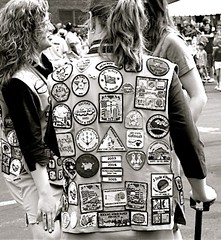Milestone birthdays come fast and furious in high school and college - 16! 18! 21! - and, by and large, they're pretty hot. Parties! Driving! Drinking! Then everything changes.
25 = Good god, the quarterlife crisis IS real
30 = I'm out of my twenties? Already? And I have what to show for it?
35 = I'm "advanced maternal age"? I only stopped thinking of myself as a kid a year ago; how am I supposed to already be done having kids of my own?! (Men, you're lucky chaps for avoiding this little head-snapper.)
I don't know about you, but as a child playing dress up, I thought all of these birthdays would be pretty darn cool. Well, maybe not 35. That was decrepit. Which, not coincidentally, is the very birthday I hit yesterday.
So today's mission: figuring out why milestone birthdays reak after the age of 21 and determining what we can we do to combat the suck.
We're Awful At Predicting Our Emotions
- The Problem: We think that future positive events will make us happier than they actually do (on an upbeat note, we also think that negative events will be more devastating than they really are). This is due to a little ditty called the affective forecasting error. You can read about it in great - and surprisingly engaging - detail in Dan Gilbert's book Stumbling on Happiness. Suffice it to say, though, that when we're young, we think being all grown up will be a hoot. Even a few days before the actual birthday, we may continue to delude ourselves into thinking it'll be one heck of a good time. Not so much.
- The Fix: Here's the good news: we're not only bad at predicting how happy we'll be in the future, we're also wretched at remembering how happy we were in the past. In fact, after an event has passed, we tend to think that our initial prediction held true. So if you predict that a milestone birthday will be exciting, fun, and empowering, you'll remember it as being just that. Even if it actually blew. In other words, you only have to get through the valley of the less-than-amazing birthDAY to get back to feeling like the milestone birthday was A-OK. (I must have a few more days to go...)
We Forget About Circumstances
- The Problem: When we try to explain why something happened - such as, why we got to age 30 without managing to launch a company, buy an oceanside house, marry the person of our dreams, and land on the cover of Forbes - we have to make an attribution. We could say that we hit the Big 3-0 without reaching our goals because:
- A: We're a lazy, stupid, good-for-nothing fool who has no prospects of ever doing anything with the rest of our life.
- B: There was a lot going on during the twenties - we were fighting to just pay the bills, were learning the ins and outs of cooking and budgeting and simply existing independently, and were trying to maintain a social life amongst it all - and, besides, it's extremely difficult for anyone to reach the lofty goals we set for ourselves, even if there were no distractors.
- Obviously we're better off if we go with B, the external attribution. Unfortunately when it comes to milestone birthdays, I'd argue that we fall prey to the fundamental attribution error, a thinking problem that leads us to focus solely on individual characteristics while overlooking situations. We usually reserve this error to explain other people's outcomes. Why we focus the laser look on ourselves in honor of our birthdays, I simply don't know. Happy birthday to us, I guess!

- The Fix: Simply be aware of this thinking error so you can correct for it. Every time you start thinking like Scenario A, picture a big, fat, obnoxious Stop sign. Then redirect your attention to all the situations that have gotten in your way (a la Scenario B).
We Overlook What We Have Done
- The Problem: I'm sure you walked out of a college class or two - or all of them - believing you hadn't learned a thing. And, sure, in some of them you actually didn't. But often you simply don't realize how much you'd progressed. On the teacher side of things, I see this all the time. (Am I biased? Sure. But even students who make staggering gains in skills unrelated to my teaching deny the change when I commend them on it.) Similarly, when it comes to milestone birthdays, we look at everything we failed to get done and forget all we have accomplished, both small and large.
-

The Fix: Give yourself a birthday gift: make a list of everything that was meaningful to you that happened over the previous year or five years. I venture to guess you'll be astonished. Sure, it might not be what 8-year-old you wearing mom's pearls and heels might have expected (yes, men, I mean you, too; I know your secrets). All the better: your kiddo self didn't know a thing about what would actually make adult life rich and full and worth living. You do. Trust that knowledge and celebrate what you've done, learned, and experienced. And don't forget to include this very tidbit of understanding on the list.
If all else fails, at least disappointing milestone birthdays can motivate us to make change. There's nothing that gets you going quite the same as a sharp milestone birthday in the rear. Is it any wonder I woke up at 4:30am today, thinking of work? Thank you hot steaming cup of a disappointing birthday. Much appreciated.
How was your most recent birthday? Did you go easy on yourself?
Related Articles:
- From CA101:
- From Others:
- Letting Go of Being Depressed About My Birthday So I Could Actually Enjoy It (Psychology Today)
- Disappointing Birthday Quotes [It's depressing that so many exist]
- And two refreshingly upbeat approaches to the 25th birthday:
Milestone birthdays can feel like a train wreck.








